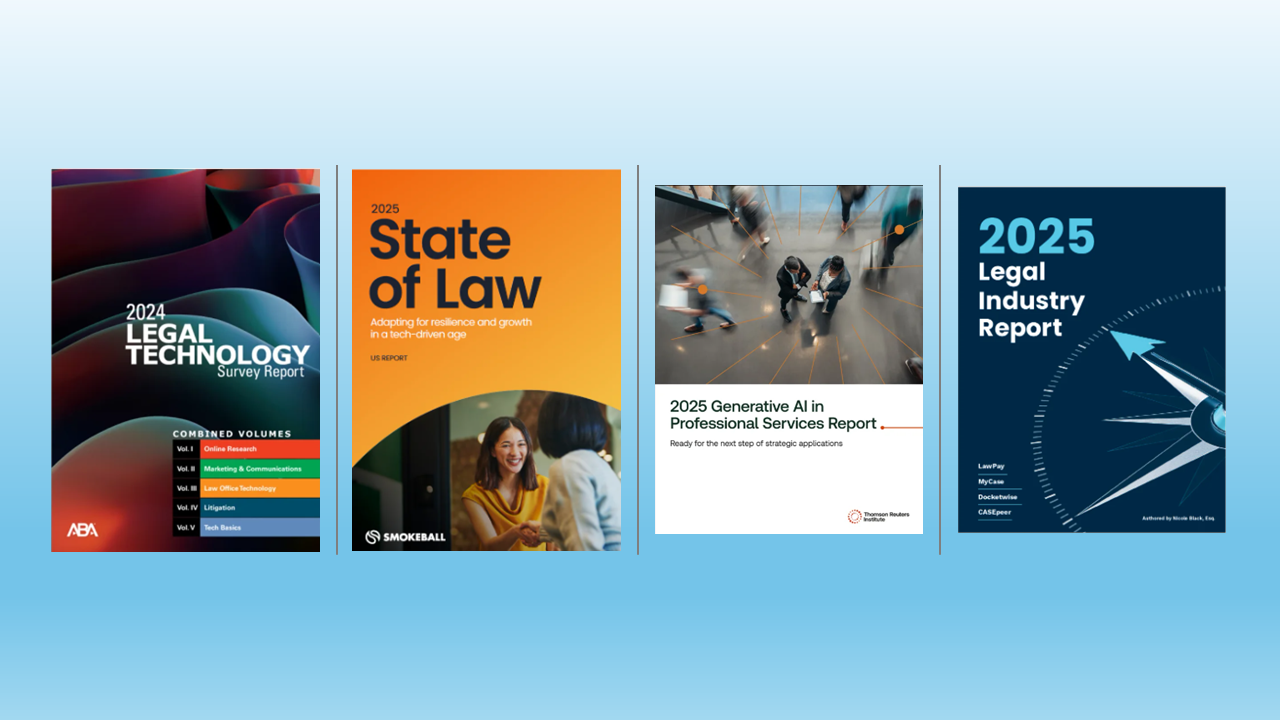Examining Four New Surveys on AI Adoption in Law: A Comparison of Insights and Differences

Recently, four surveys have been released, each examining the adoption of generative AI within the legal field. While I have shared insights on each of these surveys individually, I was curious about how their findings compared when analyzed together. To assist in this analysis, I utilized ChatGPT 4.5, uploading the four reports and asking for a comparative review limited to AI adoption.
Each survey offers a unique perspective on AI usage among legal professionals, including whom they surveyed and the main findings regarding AI adoption. The following sections will outline the comparisons drawn from these surveys.
Survey Overview
The four reports analyzed are as follows:
Who Was Surveyed?
- Smokeball Report: Targeted small firms and solo practitioners in the U.S., focusing on owners, attorneys, and office managers.
- ABA Report: Surveyed ABA-member attorneys across various firm sizes, including solo practitioners and larger firms, with an average respondent experience of 28 years and age of 57.
- AffiniPay Report: Engaged over 2,800 legal professionals across multiple practice areas and firm sizes, including many from small firms and solo practitioners, as well as larger firms.
- Thomson Reuters Report: Included 1,702 participants globally from legal, tax, corporate, and government sectors, with the majority being U.S. based.
AI Adoption Rates
- Smokeball: AI adoption jumped significantly from 27% in 2023 to 53% in 2024 among small firms.
- ABA: AI adoption increased from 11% in 2023 to 30% in 2024, with larger firms showing a higher uptake (39%).
- AffiniPay: Personal AI use rose to 31% while firm-wide adoption dropped slightly to 21%, indicating cautious adoption patterns.
- Thomson Reuters: Reported 26% of legal organizations are now using generative AI, a rise from 14%, and 95% of respondents believe AI will become essential in the next five years.
Main Uses of AI
- Smokeball: Focused on legal research (78%), document creation (75%), and e-discovery.
- ABA: Highlighted legal research (35%), case strategy development (23%), and predicting outcomes (13%).
- AffiniPay: Used for drafting correspondence (54%), brainstorming (47%), and drafting documents (40%).
- Thomson Reuters: Reported extensive use in document review (77%), legal research (74%), and summarization tasks (74%).
Challenges to AI Adoption
- Each report noted common challenges, including ethical concerns, accuracy and trust issues, confidentiality, and regulatory uncertainty.
- Smokeball: Mentioned ethical concerns (53%) and regulatory uncertainty.
- ABA: Identified AI accuracy as the top worry (75%).
- AffiniPay: Cited trustworthiness (42%) and technological maturity as barriers.
- Thomson Reuters: Also pointed out concerns regarding the accuracy of AI and misinformation.
Attitudes Towards AI
- Smokeball and AffiniPay: Generally positive views, particularly from younger professionals and small firms who see potential efficiency improvements.
- ABA: Showed mixed feelings, with more caution among seasoned lawyers.
- Thomson Reuters: Indicated growing optimism, with 55% of respondents feeling excited about AI’s potential.
Policies and Training on AI
- Smokeball: Noted a willingness to learn, but lacked specific policies.
- ABA: Did not emphasize policy or training, primarily relying on individual attorney initiative.
- AffiniPay: Reported a lack of policy and training, with many unsure about AI adoption timelines.
- Thomson Reuters: Found significant gaps, with 64% reporting no formal AI training offered at work.
Client Impact and Business Relationships
- Smokeball and ABA: Did not extensively discuss client implications but focused on internal processes.
- AffiniPay: Firms remain cautious about direct client integration of AI technologies.
- Thomson Reuters: Shone a light on client awareness, revealing that many clients are unaware of their firms’ AI usage.
Alignment and Differences in Survey Findings
Commonalities Among Surveys
- Adoption rates of AI are increasing across all reports.
- Legal research, document drafting, and administrative tasks are consistently noted uses of AI.
- Ethical considerations remain a top focus and concern across the board.
Variations in Survey Responses
- Differences in the speed of adoption were evident, with Thomson Reuters and Smokeball reporting more rapid integration compared to the ABA’s cautious approach.
- Sentiment around AI varied, with Thomson Reuters showing rising optimism while ABA respondents exhibited reluctance.
- Thomson Reuters uniquely addressed the need for clearer communication between firms and clients regarding AI practices, which was not extensively covered in other reports.
Please follow and like us:





